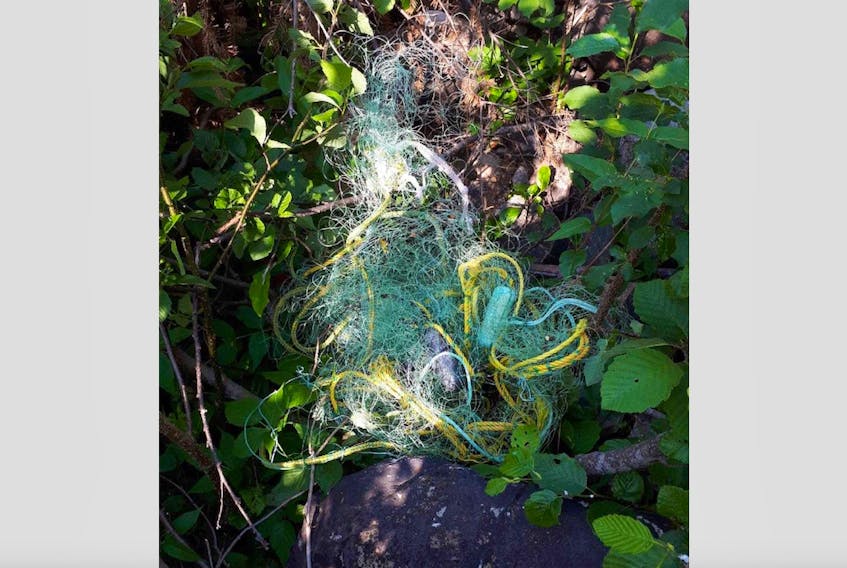Sometimes in a small tent but more often, maybe, in a carefully constructed lean-to or under a tarp concealed by tree branches in a remote area, provincial Fish and Wildlife Enforcement officers watch over an illegally set net in a salmon river and wait for the would-be poachers to return.

Usually, the poachers arrive under the cover of darkness. Sometimes the officers wait in adverse weather.
It takes determination, patience and dedication to catch those who break provincial and federal fish and wildlife laws, and to gather the correct evidence to make the charges stick.
Up to about mid-October of this year, provincial Fish and Wildlife Enforcement officers laid 50 charges for inland fisheries-related offences — that’s nearly triple the number from 2017 when there were 17 charges laid for the whole year.
Again, up to mid-October, there have been 128 public complaints of suspected illegal fishing activity received — including 67 in the eastern region, 53 in western and eight in Labrador.
The province issued a news release on Oct. 12 stating that the Department of Fisheries and Oceans (DFO) reported that the number of fishing violations on the province’s salmon rivers during the 2018 season was on par with previous years at 136 violations — eight more than in 2017 – including 41 illegal nets located and removed.
That figure, however, does not include the provincial enforcement statistics.
DFO's jurisdiction
Gerry Byrne, minister of fisheries and land resources, said DFO has jurisdiction over wild Atlantic salmon fisheries enforcement in Newfoundland and Labrador. He noted, however, federal fisheries officers are busy patrolling coastal waters and have limited time to focus on inland waters. That’s why provincial Fish and Wildlife Enforcement officers enforce both the Federal Fisheries Act and the Provincial Wild Life Act as required, he said.
Byrne noted that while DFO’s fishery officers — who include seasonal, contract and Indigenous guardians as well as DFO enforcement officers — do patrol and monitor inland rivers and related coastal areas year-round, they do so in a reduced capacity in the fall and winter.
Provincial fish and wildlife enforcement officers, however, are fewer in number but defend the resource 12 months of the year with no reduction in staffing, even during the off-season when salmon poaching may still occur and when officers are focused on their primary mandate of big and small game hunting enforcement, along with enforcing ATV, firearms, and protected areas legislation.
“Despite inland fish enforcement being the federal government’s responsibility, provincial fish and wildlife enforcement officers — 43 active officers in the province —continue to step up to enforce both the Federal Fisheries Act and the Provincial Wild Life Act,” he said.
“We are the sharp end of the spear. I say that very deliberately because we are the force that is spending a significant number of hours, overtime hours included, on surveillance. We have officers in the field on occasion for a full week at a time, never coming out of operational phase. We have officers in the field for periods of several days and moving into weeks.
“This is an extensive activity. It is not our jurisdiction. It is exclusively federal jurisdiction yet provincial peace officers are engaged in this activity. I have begun a discussion with the federal government with an expectation that it will result in federal resources being provided to the provincial government to do what is a federal job.”
Byrne said Newfoundland and Labrador is the only province in Canada that doesn’t have a devolved authority over inland fisheries or a co-management structure with the federal government on inland fisheries.
He said Newfoundland and Labrador deserves the same type of arrangement as other provinces.
“It is our expectation that the federal government will provide us with resources to be able to continue on the incredible work of our inland fish and wildlife officers as we do the federal job,” he said.
“If we cannot get federal support … we can expect there will more than likely be a withdrawal of provincial activity in inland fisheries.
“It is a reasonable expectation that we have and we have also identified sources of funding for the federal government through their oceans strategy and for the increased funding through DFO in the fall federal budget update.”
Charges laid by Fish and Wildlife Enforcement officers often result in fines and prohibitions related to illegal hunting. Most recently:
On Oct. 1 at provincial court in Harbour Grace, one person was convicted and fined $1,000 for illegal possession of big game, and prohibited from applying for a big game licence for a period of five years.
In another case the same day, a person was convicted and fined $1,000 for taking more than one moose on a big game licence, and has been prohibited from holding a big game licence for five years. In addition to the fine, a gun and ammunition were forfeited.
On Oct. 2 at provincial court in Gander, an individual was convicted for fishing violations, including fishing during closed time and angling by means other than the set method, and fined $200 on each count. Seized items were forfeited to the Crown. The convictions resulted from an investigation conducted after a Fish and Wildlife Enforcement officer observed the individual angling in scheduled waters during closed season.
On Oct. 24, also at provincial court in Gander, a person was convicted of netting in inland waters and possession of fish caught in contravention. The individual was fined $3,000 for the netting violation and $1,000 for illegal possession, and was also prohibited from fishing for a period of five years. A second individual was fined $2,000 for netting in inland waters and $1,000 for illegal possession, and also received a three-year prohibition from fishing. Items seized during the investigation, including a gill net, five Atlantic salmon, and 15 brook trout, were forfeited.









